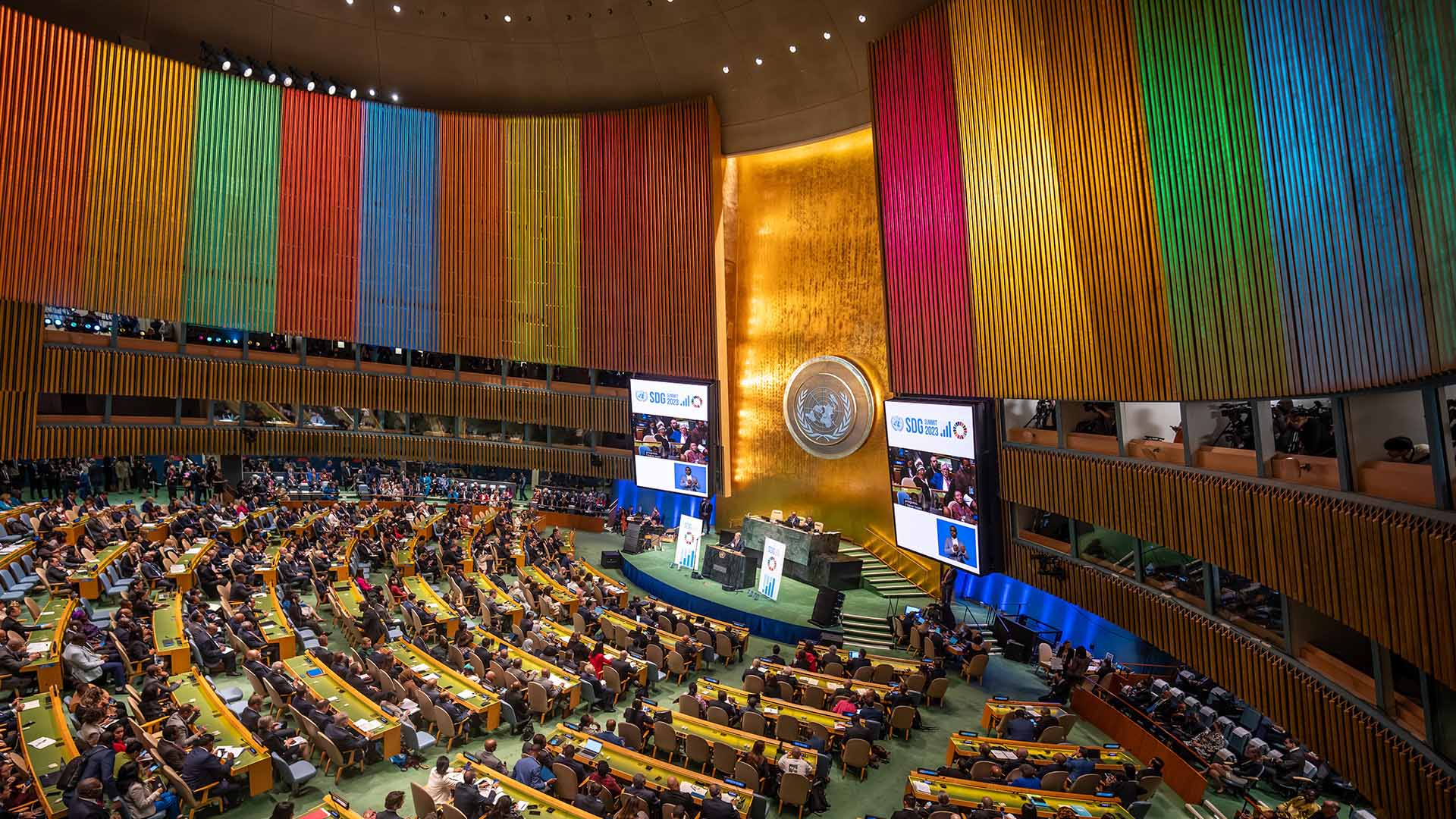Executive Summary
- The United Nations’ Fourth International Conference on Financing for Development (FfD4), to be held in Seville in 2025, will have to address the major financing needs that still remain for the attainment of the Sustainable Development Goals, taking all sources of financing into account and going much further than Official Development Aid and purely state-funded activities. The Conference takes place in a context where the current multilateral system and progress towards multipolarity is being subjected to severe scrutiny, and has the idiosyncrasy of combining processes and conversations being held in other forums, for which it should provide a significant impetus. Spain will be playing a twofold role at the Conference: both as the host and as a member state of the UN. With the latter in mind, this summary divides the financing for the development agenda into 11 strands, and for each of them suggests elements for reflection regarding the possible Spanish position in the lead-up to FfD4.
- There is an urgent need to strengthen Global Financial Architecture, which is to say the agreements and mechanisms that ensure the stability of monetary and financial systems worldwide. Three key messages require attention: (a) the reduction of asymmetry in the global financial safety net; (b) the strengthening of regulation and oversight of the financial markets; and (c) the attainment of a more inclusive global economic governance. Spain, in its capacity as host and a country that facilitates consensus, can lead this agenda given its membership of the EU, its national interests and the current geopolitical context of conflicts, alliances and leaderships. The key will lie in managing diverging interests, identifying winners and losers and the most appropriate international forums for promoting inclusive and sustainable decisions.
- Official Development Aid (ODA) plays a fundamental role in the financing of development, but despite rising consistently in absolute terms, it remains a long way from the 0.7% of GDP promised by donor countries. The successive reforms of the way in which it is measured have furnished it with more and more targets, but without an increase in resources to match. Moreover, its governance is not representative of the current community of donors, and the eligibility conditions for aid do not entirely align with many countries’ needs. Total Official Support for Sustainable Development (TOSSD) is a more comprehensive and reliable way of measuring the complex reality of the various types of development financing streams, but it still suffers from governance and measurement issues. In order to differentiate and spotlight the goals that ODA and the other development financing streams ought to be prioritising, it is proposed that the governance and measurement of TOSSD be strengthened: relocating the headquarters to the Global South, broadening its membership and the number of countries reporting on a systematic basis and, in the medium term, initiating a conversation about an eventual setting of a target for mobilising resources befitting the current context.
- The challenges of the 21st century, including the persistence of poverty, political fragmentation and the threat of climate change, require profound changes to the system of Multilateral Development Banks (MDBs). Geopolitical tensions severely hinder reforms such as adjusting the quotas and voting percentages, especially for countries such as China, India and Brazil, which makes an injection of fresh capital into these banks more difficult. But it is possible to consider other reform agendas, such as Summers and Singh’s Triple Agenda, where progress is being made and that consists in updating and improving financing and the operating mechanisms and mandates of multilateral banking. Greater ambition can also be shown in the review of capital commitments, the recycling of Special Drawing Rights (SDRs) and hybrid capital to broaden the MDBs’ scope for action or to transition from financing specific projects to a more structural and integrated vision of development. Spain, as a nexus between Europe, Latin America and the rest of the Plural South, should give impetus to these reforms.
- The international architecture surrounding external sovereign debt needs to be improved, as it fails to produce the efficient and equitable results that it should, something that loads costs mainly onto developing countries burdened by overindebtedness. The proposal for the Spanish stance on this matter on the eve of the FfD4 revolves around two main ideas: reconfiguring the system so that it operates to a greater extent on the basis of shared rules and agreements, which would enable vast gains in efficiency and fairness to be secured, especially for the poorest nations; and that the transition towards this overhauled system should be guided by a combination of clear direction and pragmatism. First, this would involve amending the current institutional framework with specific reforms that already attract wide-ranging agreement, referred to in the G20’s Common Framework for Debt Treatments beyond the DSSI. Secondly, it would require the UN promoting processes of reflection on less mature aspects that will underpin potential future reforms geared towards the system making the greatest possible contribution towards sustainable development.
- Since the 2015 Addis Ababa Action Agenda (AAAA), which flagged the importance of the private sector in the creation of inclusive and sustainable industrial processes, changes in the world economy have replaced the consensus on trade and the geographical aspect of production with a willingness to create industrial policies in developed countries linked to strategic autonomy and national security. Global value chains reflect a transnational productive reality more closely resembling a production network of multidirectional relationships, complicating the analysis of productive-trade processes, the relationships between sectors and countries and their impact on the SDGs. The classic variables of Foreign Direct Investment (FDI) and trade lose their utility, requiring raw material-product methodologies that enable national-sectoral categories to be overcome. This necessitates financial and technical support and legislative frameworks for collaboration with companies in the gathering of information and the traceability of productive processes, which would enable their impact on development to be evaluated and contribute to policies of strategic autonomy.
- Private sources of impactful investment are restricted by private investors’ substantial perception of risk, a lack of reliable and transparent data, scant investment in the local currency and the mismatch between financial instruments and tickets and the demand in less advanced countries, also known as the missing middle. Recently, the efficacy has been demonstrated of structure-focused approaches strategically designed for co-investment and of innovative financing mechanisms such as transformational technical assistance facilities, as well as the positive impact on the SDGs of investment in the local currency, the empowerment of local actors and the use of gender- and child-lens impact investing. To scale up the volume of private capital and to improve the efficacy of investments, it is advisable to: (a) use the existing and proved de-risking instruments in a strategic and effective way; (b) invest in projects geared towards strengthening local high-impact investment ecosystems; and (c) agree standards for impact measurement and management to improve transparency and investors’ decision-making and to prevent ‘impact washing’.
- The remittances sent by migrants to their families and communities in their home countries exceed the size of ODA and FDI, which means that, although by their nature these inflows cannot be replaced, they play an important role in directly improving people’s welfare and are moreover capable of being channelled towards productive ends. International agreements seek to remove barriers to such inflows and their positive impact. Despite recent technological and regulatory progress, Spain should continue striving to ensure compliance with the Global Compact for Safe, Orderly and Regular Migration, focusing on: the reduction of transaction costs for remittances (goal 10c of the 2030 Agenda), favourable and appropriate regulatory and normative frameworks, a gender-based approach, a commitment to technological solutions that include people with greater difficulties and the design of instruments for channelling remittances towards investment in development; all this bearing in mind best practice and previous successful experiences.
- International climate financing is one of the key tools for complying with the Paris Agreement. The current state of affairs and the new financing target set at COP29 are analysed, as is the degree of compliance with the existing commitments and the relationship between ODA and climate financing. Relatively recent proposals are examined for the channelling of financing through taxation systems and debt swaps for climate action. The designs stem from opposing normative positions on the asymmetrical responsibilities of donors and recipients, accounting and transparency. Five proposals worth considering include: the improvement of governance processes; the design or broadening of various instruments, such as debt swaps, the expansion of Just Energy Transition Partnerships(JEPTs) or Country Platforms and the expansion of microcredits; the deployment of adaptation support mechanisms; and strengthening the means of implementing and developing dialogue groups for attracting climate financing to recipient countries.
- The challenges of mobilising developing countries’ domestic resources occupy a prominent place in development agendas, policies and analyses. Given that taxation systems in the developing world operate in more complex circumstances than those of rich nations they generally have diminished revenue-raising capacities as a consequence. Over the course of recent years however, owing in part to their own economic growth but also to the reforms many such countries have introduced, notable headway has been made. This is not to deny that major challenges remain, some of them more traditional and of a domestic nature, others more recent, related to changes in international tax regimes and the expansion of the digital economy. Successfully overcoming these challenges is important if progress is to continue being made in mobilising home-grown resources, something that international cooperation can make a notable contribution towards. In some areas, such as technical support, it is relatively straightforward; in others, such as coordination on taxation, it may prove more complex, given the existence of mutually opposing interests in some cases.
- The international governance of trade has undergone significant setbacks in recent decades. The current geopolitical framework dampens ambitions for establishing regional trade agreements and direct investment, or a comprehensive reform of the World Trade Organisation (WTO), but it is essential in the interests of the developing countries to keep some basic rules operating to prevent any further deterioration in governance or the emergence of a merely bilateral trade negotiation framework. This is why it is worth focusing on just a few elements of improvement, such as trade facilitation (simplifying and coordinating technical requirements), promoting universal aspects of sustainability such as support for small and medium-sized enterprises and the economic empowerment of women, the simplification (in the EU) of the bureaucracy surrounding initiatives such as GSP+ and EBA, or reforming one or two key aspects of the WTO (resolving differences and subsidies), reserving political capital for proposals such as the ratification of the EU-Mercosur Agreement, which conveys a message of the West’s credibility in its commitment to development and the strategic interests of the Global South.
- Scientific and technological advances are key to countries’ progress and attaining the SDGs. Given the ongoing asymmetries in creating, adopting and adapting to innovations, international cooperation on science, technology and innovation (STI) plays a key part in the development and financing agenda, as recognised by the AAAA and the new Spanish Cooperation Master Plan for Sustainable Development and Global Solidarity 2024-2027. A review is undertaken of the conceptual approach to the link between innovation and development due to its importance in defining, implementing and measuring international cooperation on STI, and the current situation is described in this respect in order to ascertain which aspects are worthy of emphasis and what the financing frameworks are. Lastly, a series of conclusions and reflections are put forward aimed at identifying those fields in which Spain can devise proposals within the FfD4 framework.
- One of the common factors emerging from the analysis is the debate surrounding the level of ambition appropriate for FfD4, bearing in mind not only development needs but also the current geopolitical context, which obliges the possible deadlines for the various proposals to be considered. While they are by no means monolithic blocs, the differences between the stances of the North and the Global South emerge repeatedly, as does the need for stronger cooperation and for acknowledgement of the interrelationships between issues on the agenda. It is essential to acknowledge the different realities, needs and characteristics of each financing stream, and to harness the accumulated experience and the lessons learnt with an analytical outlook that includes the gender perspective and other structural inequalities.
- Spain can contribute to creating spaces for dialogue and acting as a bridge, as a member of the EU, of the OECD and of the DAC, of the UN, a partner to Latin America and a country that shares climate challenges with countries in the Global South. This is why it will need to adopt a logic of variable geometry in its search for alliances, bearing in mind that neither the North nor the South are compact blocs, as well as the impact that the proposed initiatives may have on Spain, without losing sight of the ultimate goal of all these efforts, namely sustainable development. In alignment with the foregoing, the conclusion of the document contains a summary of all the recommendations put forward in all of the agenda’s areas.
Image: General Assembly Hall at the United Nations headquarters in New York during the conference on the state of the Sustainable Development Goals (SDGs) (18/09/2023). Photo: Michael Kappeler / picture Alliance / Getty Images.





